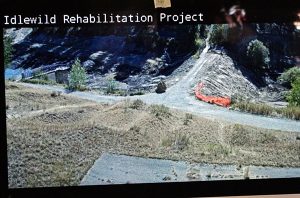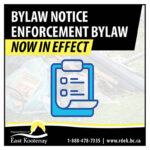Home »

City must borrow $10 million: Pratt
By Ian Cobb
e-KNOW
City of Cranbrook Mayor Lee Pratt addressed local media Oct. 19, seeking to fully outline his administration’s approach to tackling road work in the city and explain the importance of borrowing $10 million (over 20 years) to put toward much-needed repairs.
The matter is currently in the local taxpayers’ court as the city’s ongoing Alternative Approval Process (AAP) continues toward a Oct. 31 deadline.
In order to be able to borrow the money, the city must first receive electoral approval via an Alternative Approval Process. The AAP operates on those opposed to the borrowing voting against it by submitting a completed copy of an elector response form. The deadline is 4:30 p.m. Oct. 31.
If 1,499 votes are received, 2017 Capital Roads Program Loan Authorization Bylaw No. 3862, 2016 will be struck down.

The funds would be utilized to resurface or reconstruct many arterial and local roads in residential, commercial and industrial areas, as well as a full reconstruction of 2nd Street South from Highway 3 through to 10th Avenue South with repaving from 10th Avenue South through to 14th Avenue South.
Pratt said city taxpayers need to become updated on the AAP and expressed concerns about a local group that is working to generate AAP votes.
Pratt said the results of the last municipal election showed that city residents want the road problems addressed and he and his council ran on doing just that.

“The collective voice of our community was to do something about our roads. We heard you loud and clear and we’ve delivered on that promise and will continue to do so. If this Alternative Approval Process stops the proposed borrowing, we will go to referendum and I have no doubt that it will pass. Unfortunately, referendums cost upwards of $50,000 and the reality is if we go to referendum that will delay the significant road work until 2018. That money would be better spent on pavement and employing local people and stimulating our local economy. That small increase in tax now pales in comparison to the alternative,” he stated.
Concerning to the mayor and council is a public push to generate AAP votes, with misinformation guiding the way, including the issue of available grants from other levels of government.
Pratt said city administrative staff members are always looking into available grants, citing “all of the work at Idlewild Dam” is being paid for by $2.8 million in funds from the Federal Gas Tax Program as an example and staff will continue to seek grants for roadwork.
 “A second myth that is out there” is a “misconception we don’t have the qualified people in Cranbrook to do this type of construction,” he said, adding, “The fact is we have very capable local companies and local tradespeople, keeping your tax dollars in the community and keeping our local people working is a major consideration of this council. Of the four major capital construction projects the city tendered in 2016, including Idlewild, all the successful bidders were local contractors. This is important and we want to see all our future construction tenders to be in the reach of our local companies to bid on competitively.”
“A second myth that is out there” is a “misconception we don’t have the qualified people in Cranbrook to do this type of construction,” he said, adding, “The fact is we have very capable local companies and local tradespeople, keeping your tax dollars in the community and keeping our local people working is a major consideration of this council. Of the four major capital construction projects the city tendered in 2016, including Idlewild, all the successful bidders were local contractors. This is important and we want to see all our future construction tenders to be in the reach of our local companies to bid on competitively.”
Pratt said the most concerning thing to him and his council is “there is a group of individuals in this community actively petitioning residents door-to-door to sign an electoral response form which says they are against the proposed borrowing. Some of these individuals were actually previous councilors that during their tenure on council did nothing about the infrastructure and that is part of the problem that we have today.”
Pratt said he would like taxpayers to make sure they know what is happening and to educate themselves about the AAP.
“Every single resident has the right to sign these electoral response forms if they are against the borrowing but it is also important to educate yourself about the facts of the proposed borrowing and not base your decisions solely by what someone knocking on your door decides to tell you.”
Pratt said the city’s website has plenty of information (see below for more) and “every member of council is approachable; call us. Stop us on the street; talk to us. Bring us your questions and we’ll help you understand why we want to borrow and what this money will be able to accomplish.
“What concerns me greatly is we don’t know what these individuals are telling people and are deeply concerned that what our residents are being told by this group are not actually factual. History around past AAPs in this town suggest that this group has targeted seniors and those who are perhaps more vulnerable in the past. Using high pressure tactics to get elector response forms signed.
“We’ve had residents come to us before telling is these same stories. In fact, I have spoken to two individuals just this past week who didn’t get all the information and have requested their signed response forms be returned and not counted. I strongly suspect there are more people out there who feel the same way. For those in the community who perhaps felt pressured by this group of individuals and you wish to change your mind, we have a form available now which will allow you to rescind your signed electoral response form.”
Pratt said the forms are available at City Hall and are also available on the city website. The deadline remains Oct. 31.
The mayor stressed the city desperately needs to spend money on its crumbling infrastructure now.
“Ignoring the problem will not make it go away. The time for action is now,” he said. “The timing to borrow money is right now. We have low interest rates, we have an available workforce and we have the asset plan that we can implement and put strongly to work for us.”
Pratt said there are other advantages to the city tackling bigger roadwork projects, beginning with economic advantage.
“I am actively pursuing new industries and new jobs to pay taxes, thereby reducing everyone’s tax load. We’re talking about… we need affordable housing, we have a very low vacancy rate here – we could use an apartment complex. When I talk to these people, they come in and look at the infrastructure and they are worried. Is this infrastructure going to support my venture, or is it just going to add a whole bunch of tax money to my costs of doing business?”
Residents also need to understand exactly how much paying down the proposed borrowing will cost them, Pratt said, explaining that it will be $16 per every $100,000 of assessed value of a property, along with a $15 parcel tax.
“For example, if you have a house and your assessed value is $300,000, your cost is going to be three times $16 which is $48, plus $15 – which is $63 a year. That’s $5.25 per month. That’s not even a package of cigarettes; it’s a glass of beer; it’s a cup of coffee but people, because they have been fed wrong information and are looking at the wrong picture altogether, they get all upset thinking this is crazy. And one of the previous councilors posted on social media that Lee Pratt is going to leave this city a legacy of high debt and high taxes. And that’s wrong. It’s totally wrong but that is what people play on.
“This council is concerned about taxes and trying to control them,” Pratt said. “We’ve found efficiencies, we’ve cut corners, we have found savings; we haven’t cut any city services but we’ve maintained a very low level of a tax increase (2.26%) and I think that is commendable to this council.
Paying about $63 a year extra in taxes to help give the city a stronger attack plan for the roads “is cheap,” Pratt said.
Try out the city’s Estimated Tax Impact app for your property to get a sense of the cost to you.
“The big picture of it is: do we spend it now or do we wait until we have a major, catastrophic condition?” He asked, noting 2nd Street South poses such a possible threat to the city, with breaks in the sewer line below the road.
A catastrophic event would mean the city would have to quickly borrow money on a short-term loan and that would jack up the city’s tax rate.
The proposed $10 million to be borrowed would be added to the $4.1 million already budgeted for roadwork, bringing the total anticipated road budget to $14,116,900 for 2017.
If the borrowing is not approved, the only roadwork that will be done next year will be 2nd Street South, Pratt said. “We’ve prolonged it for two years; luckily we haven’t had a catastrophic event there. But we cannot dodge this bullet any longer.”
Fixing that stretch of road would take two years, without extra funds, meaning it would be the only road being fixed in that time, Pratt warned.
“The roads in this town will continue to deteriorate; the infrastructure will deteriorate and when we get around to fixing it, what is it going to cost us then?” He asked, noting the continual increase in the cost of doing business.
Pratt also noted saving $10 million is not an option, as that again would mean a bigger tax increase or cuts in services. “We cannot save $10 million. And if we had that kind of money saved up in reserve, trust me, my door would be swinging from people coming in and complaining; what’s all this money you’ve got saved?”
Safety is another consideration for the borrowing, Pratt continued.
“We have roads in this town that are totally unsafe to drive on!” he said. “It has to be addressed, without a doubt. There are cave-ins, there are spots where there could be a cave-in, there’re raised manhole covers. All of a sudden you are driving at night and bang, you tear the motor or transmission out of your car. Safety is a big factor.”
The city’s Asset Management Plan notes it would cost about $100 million to fix all the city’s roads.
Withdrawal form for Alternative Approval Process







